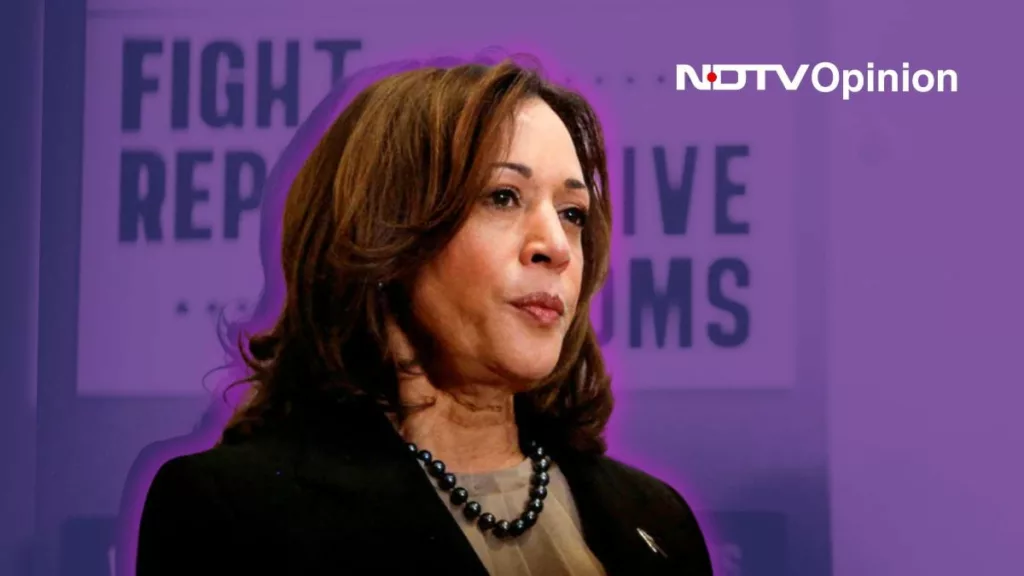“We did it, Joe,” exclaimed the 49th Vice-President of the United States four years ago-the phrase becoming a war cry of sorts, coming from a half-Black, half-Indian woman, married to a Jewish-American man. This moment became a landmark in the sociopolitical history of the US. For all its celebratory moments, American democracy has a long way to go in terms of representation and inclusivity. When it comes to women, the gender schemas work as effectively in the oldest democracy of the world as it does in the emergent ones to keep women away from the high table.
Can Kamala Harris be successful in the Holy Grail pursuit of occupying the Oval Office? The odds are stacked against her, starting from the delayed announcement of her candidature. With less than a month to go for the Democratic convention to secure her name on the ticket, Harris has a mountain to climb. The funding numbers are encouraging but the money can go only thus far in attitudinal and ideological battles.
Women And Politics
To begin with, there is a problem with the recall. Studies (J Hitchon & C Chang, 1995) have revealed that voters recall women candidates in terms of their family and appearance and their men counterparts in terms of campaign activities. Harris understands that and has made this tendency work for her by highlighting her family background. However, in a deeply polarised American society which is in the throes of backlash against diversity, equity and inclusion (DEI), this strategy may not work as desired any longer.
Also Read | Indian Americans In Offices Not Reflective Of Their Population: Kamala Harris
American women have been consistently voting at a higher rate than men for more than four decades now. They are certainly not less political than men. Yet, even they are not sending enough women to political offices. Women candidates continue to get penalised for expressing emotions, particularly anger. Harris has been trying to keep her ‘anger’ in check, often descending into banalities in her public speeches. She has become a constant fodder for the meme factory. Whether this is a carefully crafted strategy, only time will tell.
“Too Coloured”, “Not Coloured Enough”
Harris was only the second Black woman elected to the US Senate in the history of the country. This tells the world something that the Americans cannot be proud of. “The most disrespected person in America is the Black woman. The most unprotected person in America is the Black woman. The most neglected person in America is the Black woman,” said Malcolm X in 1962. Per some critical indices like education, healthcare, wages et al, the observation holds even today. Harris has come a long way jumping over fiery hoops of racial and gender discrimination. Her win in the presidential polls will be a bigger moment than Barack Obama’s presidency in terms of America’s race issue. A decade after the ‘Black Lives Matter’ movement first made its appearance on social media, American society continues to struggle to find the golden equilibrium. The anti-DEI rabble-rousers have now found effective means to punish individuals and institutions that do not toe supremacist lines.
Watch | “She’s Experienced, Tough, Capable”: Joe Biden Praises Kamala Harris
But Harris is not just Black, she’s also half-Indian and the country celebrated her from New Delhi to Chennai as its prodigal daughter. With a steadily growing population in the US over the years, Indians have emerged as a group with political aspirations. Indian community’s cultural, regional and religious associations have played an important role in increasing the political heft of Indian Americans. The flip side of this is the growing resentment among the fraudulently so-called originals-the Whites-against powerful immigrant communities. Ironically, even Black Americans harbour some resentment against immigrant communities that have reached the upper rungs of the socio-economic ladder. While this is sociologically ‘natural’, people like Harris are peculiarly affected. She’s coloured but not adequately so for some.
A Course-Correction Too Late
2024 is no 2018, when a surge for Democrats in general and women candidates in particular, sent Democratic women politicians of different ethnicities like Debra Haaland and Sharice Davids (Native American); Ayanna Pressley and Jahana Hayes (Women of Colour); Veronica Escobar, Sylvia R. Garcia, Alexandria Ocasio-Cortez (Latinas) to the Congress. The Republican campaign is bolstered by many a foreign policy faux pas of the Biden administration, the most important one being its role in the Israel-Palestine conflict. Even the captive Democratic voter is expressing dissent. The assassination attempt on Donald Trump has catapulted his already strong chances.
Choosing Harris over Biden is a tactical course-correction for Democrats, but it may have come a bit too late in the day. Her strengths may not get optimised, her weaknesses are for all to see. As her V-P tenure goes, she has all the blame to carry but no benefits to reap.
Harris has the unenviable position of being the woman who cleans up after a man. If she emerges triumphant, it will be her personal victory, not that of the party.
(Nishtha Gautam is a Delhi-based author and academic.)
Disclaimer: These are the personal opinions of the author
